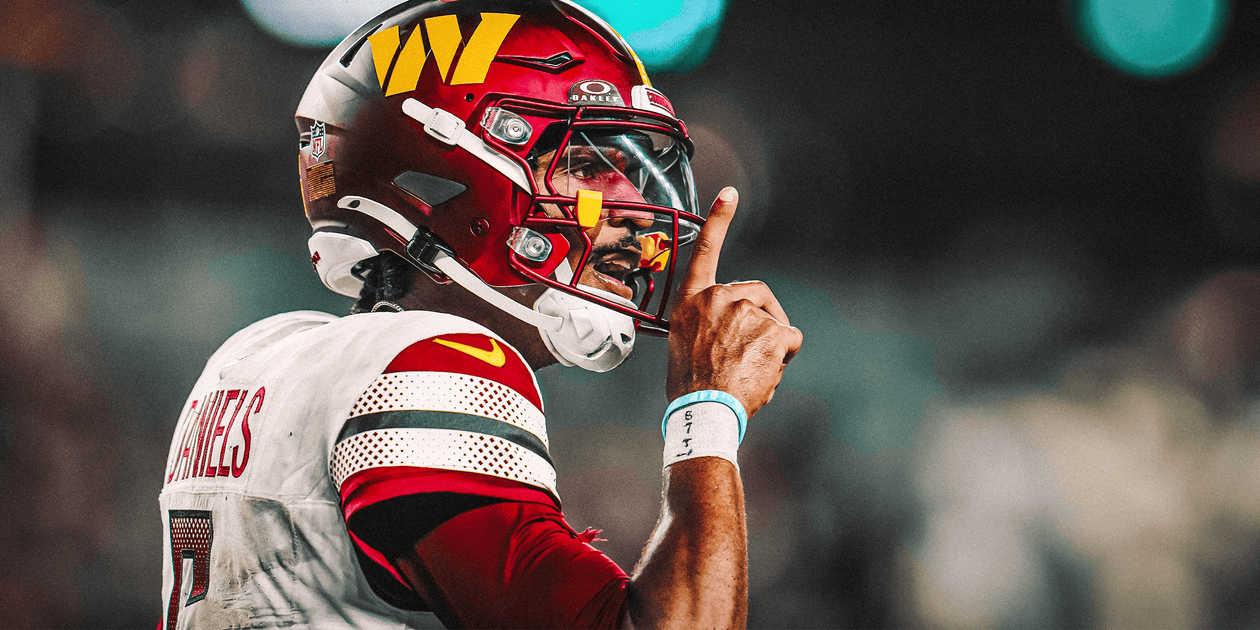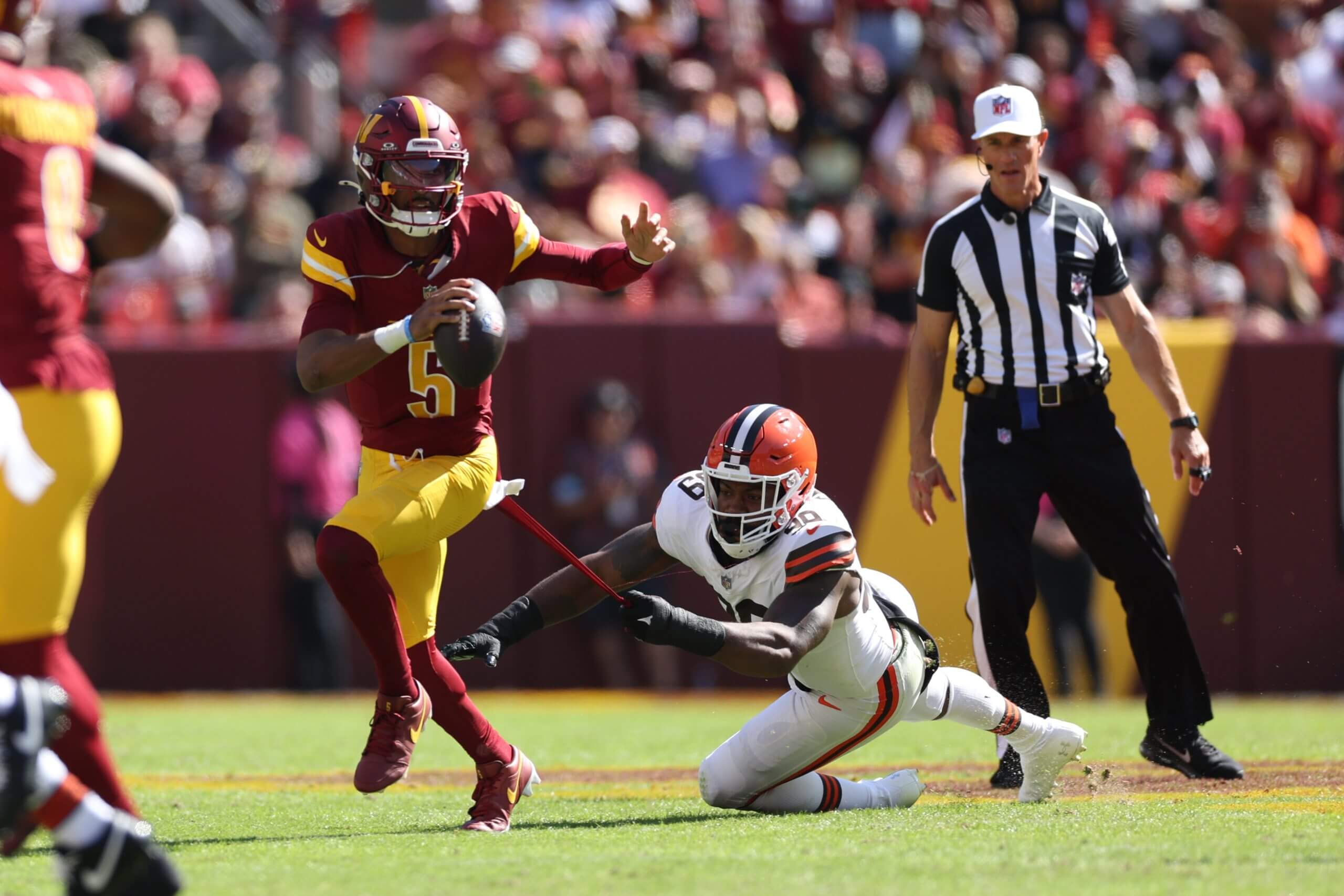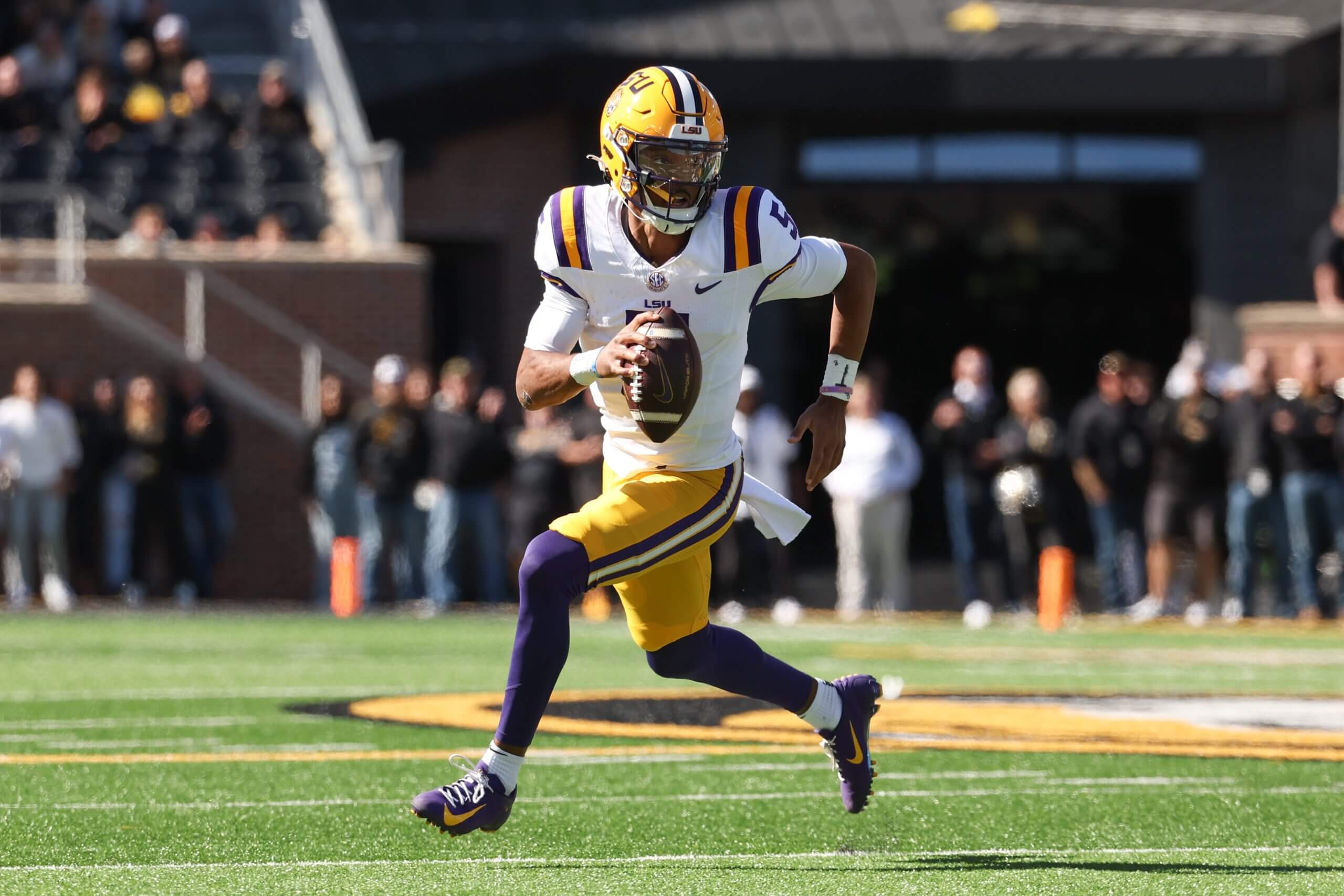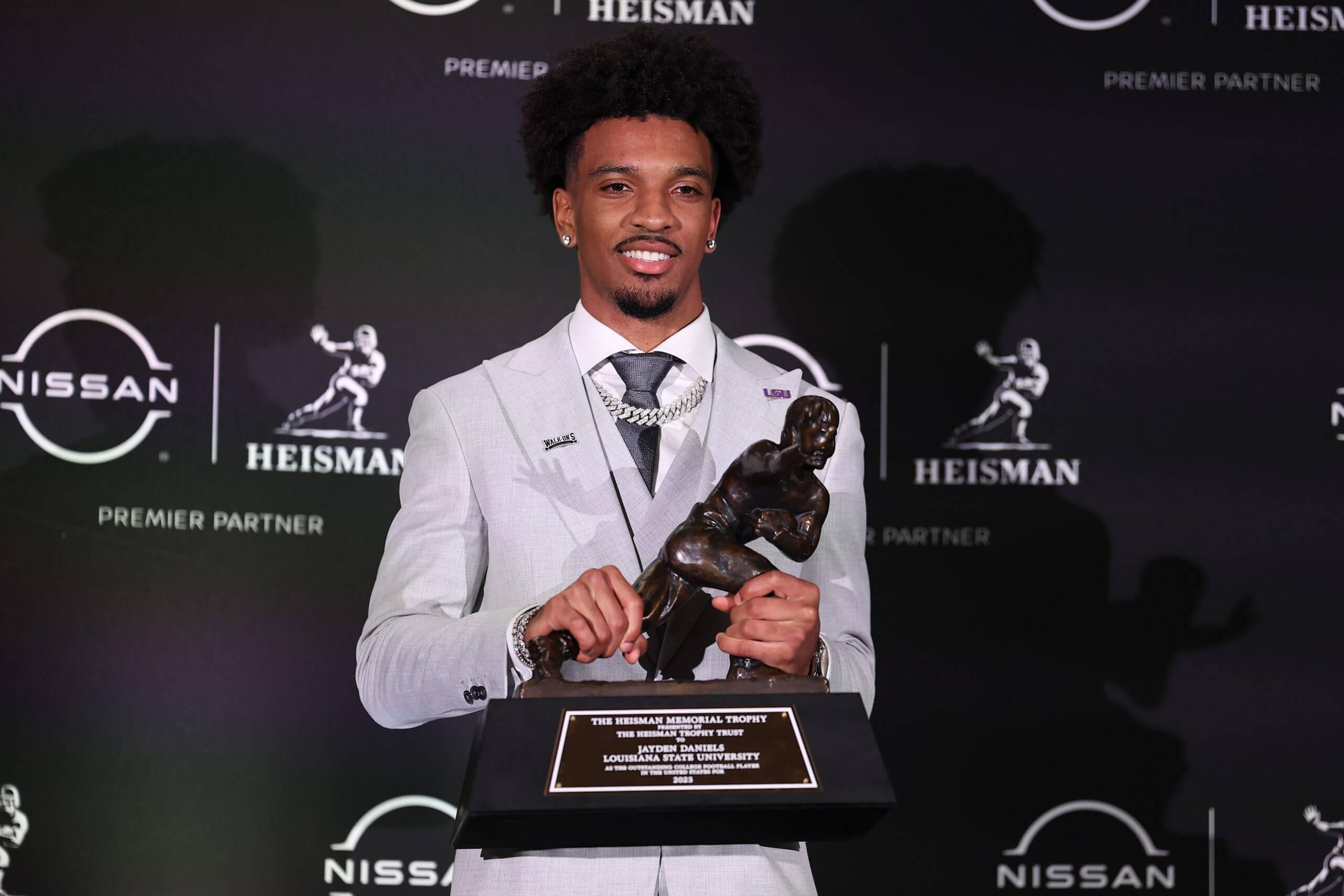
Ashburn, Va. — His alarm buzzes at 4:45 a.m. each morning, but most days Jayden Daniels doesn’t need it. He’s already awake, driving through the predawn darkness, pulling into an empty parking lot at 21300 Coach Gibbs Dr. The routine he started his final year at LSU has become a staple of his rookie season in the NFL.
“You always here this early?” Adam Peters asked after bumping into Daniels in the hallway around 5:30 a.m. a few weeks ago. Peters, the Commanders’ first-year general manager, was headed to the weight room. Daniels was about to watch some film.
“Usually, it’s a little earlier,” Daniels told him. “But I had to make an extra stop today.”
Peters looked down. Daniels was holding two boxes of donuts, gifts for his offensive linemen.
For a while, his teammates didn’t know he was showing up so early; Daniels studies with the door shut and doesn’t tell anyone he’s there. But in time, the car that kept beating them to the building, day after day, week after week, started to tell them something. A few started to wonder: is it normal for a quarterback to show up this early?
“Not normal for most,” says linebacker Bobby Wagner, a 13-year veteran bound for the Hall of Fame. “Normal for the great ones.”
After Washington took Daniels second in April’s draft, the team’s new center, Tyler Biadasz, figured he’d start coming in early to work with the rookie on exchanges. He showed up at 6 one morning and realized he was late. Daniels was already on the practice field, repping that day’s walkthrough. Alone.

GO DEEPER
Jayden Daniels’ growth with VR simulation has Commanders embracing mind games
Terry McLaurin knew after his first practice. Daniels hadn’t been on the field 15 minutes — hadn’t been in the building a week — and he was already making checks at the line of scrimmage. Then the rookie made a throw that cut through the teeth of the defense, a throw McLaurin remembers in detail five months later.
“Here’s why this play is different,” the sixth-year Pro Bowl wideout says. “The receiver’s running a crosser, and most guys wait to release it until he clears the hook defender in the middle of the field. They wait until that window opens up, you know?
“Jayden threw it before there even was a window. I’ve never seen a rookie do that.”
Linebacker Frankie Luvu was on the field that day. He saw the throw. He knew, too.
“We gotta get our s— right on defense,” he told himself, “because we got ourselves a quarterback.”
A quarterback? This team? After churning through 27 starters and 10 coaches during the Dan Snyder era — winning just two playoff games in 24 years — as one of the NFL’s proud franchises dissolved into dysfunction?
There were league investigations and Congressional hearings. Leaked emails. The name change. The railing collapse. RGIII’s knee. Cover-ups. Lawsuits. And losing. Years and years of losing.
“I’ve seen this place from afar, and there was always this black cloud over it,” says Washington tight end Zach Ertz, who spent eight-plus years beating up on the franchise as a member of the Philadelphia Eagles. “This was an organization that always had talent, but you were never worried about them long-term.
“With new leadership, a guy like Jayden, the right group around him … this city has waited for this.”
Still, this is a scarred franchise and a scarred fan base trying to shake that lingering fear that’s been beaten into them for 30 years.
Paul Walker is 65. He’s wearing a burgundy Sonny Jurgensen No. 9, tailgating ahead of the Commanders’ Week 7 meeting with the Panthers. “My first game in person since the Monday Night Massacre,” he says, referring to the night 14 years ago when Eagles quarterback Michael Vick torched Washington for six touchdowns in a 59-28 win. “We always got that mentality that something’s eventually gonna go wrong. It just always has.
“But I’m telling you, this season is bringing me back to the Joe Gibbs years. Our quarterback might be the best one we’ve had since …”
Walker pauses, then points to his chest, to Jurgensen’s No. 9.
Rob Abelman fell in love with football during the Gibbs years. He used to tag along with his dad to games at RFK Stadium, and he watched two Super Bowl wins in person. Then he got so fed up with the team during Snyder’s run that he canceled his season tickets.
The minute he read Snyder was selling the team, he signed up for new ones. “I have the belief because I’ve seen it,” says Abelman, who with his son, Jared, drives in from Philadelphia for games. “(Jared) doesn’t. He’s 24. All he’s known his whole life is heartbreak.”
Sunday spoke to both. A 40-7 romp over Carolina — the NFC East-leading Commanders’ fifth win in six weeks — was tinged by Daniels’ first-quarter exit. It’s a rib injury, not expected to be anything serious, but a reminder nonetheless for a fan base trying to convince itself it’s allowed to believe again.
Hope remains a dangerous thing in the District.
It started with an arena league quarterback drilling his dropbacks on an empty field just west of the San Bernardino Mountains. Ryan Porter was mid-sweat when Jay Daniels walked out of the YMCA across the street, recognized him, and asked if he’d ever considered coaching. Porter shook his head.
“But I guess I could,” he finally said.
“Cool, we’ll be here tomorrow,” Jay told him. “I have a son who plays quarterback.”
By that point, Jay had pushed his 12-year-old to think about a different position. Jayden was long and lean, always the fastest kid on the field. “What about wide receiver?” dad would ask. “Or cornerback?” Jay had played the latter in college, first at Washington, then Iowa State, and to him it was merely a numbers game. “Way more opportunities to get on the field,” he’d argue.
The conversation kept coming up. The two kept going back and forth.
“Dad,” Jayden always shot back, “I’m a quarterback.”
“He was hell-bent,” his father says now.
So it was settled. Jay wouldn’t fight his son’s ambitions; he’d nurture them.
The first thing he did was warn Jayden. “You’re gonna have to live in chaos,” dad said. “If you can live in chaos, then you can do this.” They’d spend hours on YouTube, poring through old games, studying some of the best to ever play the position. Jay wanted his son watching Joe Montana, because Joe Montana never lost his cool. “Look at his face,” he’d tell Jayden. “His expression never changes.”
A hard lesson came early, and it stuck: Jayden was 7, playing defense in the Pop Warner championship, and he was beat around the edge for a touchdown. He looked up at his father, about to burst into tears. “Don’t cry,” Jay pleaded. “It’s just one play.”
He knew if the team’s best player lost it, everyone else would, too. The tears spilled out. The whole team followed. “The game was never close after that,” Jay says.
That afternoon — and what it taught Jayden — has stayed with him ever since. He built an unflappability into his game, refusing to get rattled. He knows teammates are watching, and teammates will follow.

Seven games into his career, Jayden Daniels leads the NFL in completion percentage (75.6) and ranks sixth in passer rating (107.0). (Patrick Smith / Getty Images)
Jay had always been a football junkie; his son became one too. They’d watch college games on Saturdays and the NFL on Sundays. They’d watch day after day of the scouting combine, then the entire NFL Draft. Porter, who would work with Jayden through high school, learned something early on: this wasn’t just a hobby, and it wasn’t just a sport.
“I call it an unhealthy obsession,” the coach says. “Not one time did Jayden ask, ‘Hey, are my two hours up?’ He was there to get better. He was never bored. He was just in love with this thing called quarterback.”
Jay would send over videos from Jayden’s U-14 games. “OK, we got the zone read and RPO bubble down,” he’d write. “What’s next?” Porter realized he could teach Jayden a drill and never have to repeat himself. He’d see a nod, hear “Mmmhmmm” and nothing more.
During workouts, Porter worked the feet more than he worked the arm. The smooth dropbacks Jayden employs now in burgundy and gold — the big five, rhythm five, flash give, seven step, one-step bounce — were first honed on that empty field across from the San Bernardino YMCA. Jayden saw progress through thousands of reps.
“Your eyes control your feet, and your feet control your arm,” Porter kept telling him. He never once tinkered with Jayden’s mechanics. He saw no need. “It’s like a slingshot,” Porter says. “Throwing a football for somebody like Jayden Daniels is a very natural thing. The minute I make it unnatural, I’ve failed him as a coach.”
Jayden’s talents blossomed at Cajon High in San Bernardino, where his parents had to sign a waiver to allow him to play varsity as a freshman. “He was maybe 130 pounds,” Jay says. The Cowboys were state champs three years later. From there the spotlight began to swell, just as Jay had warned, and Jayden wrestled with the rigors of being a star quarterback. The pressure mounted his senior year: Everyone wanted five touchdowns a game, another state title, and, most of all, his college decision.
Jay saw it on his son’s face at halftime of Cajon’s playoff opener that fall. Jayden was playing lousy. He looked overwhelmed. Walking into the locker room, coaches kept pulling him aside, pointing out mistakes. The weight of it all, the hype, the expectations — he was a 17-year-old kid shouldering too much.
“Say something to him,” Jay told Porter, who by that point was an assistant at Cajon.
So while Jayden warmed up before the third quarter, Porter pulled out his phone and showed him a picture. In it, Jayden was 12 years old, smiling ear to ear, doing his favorite thing in the world: playing football. “Forget all this BS right now,” Porter told him. “I just need you to be this kid.”
While Jayden stared at the photo, a tear trickled down his cheek. He threw three touchdowns after halftime. Cajon won 39-7 and made its way back to the state title game.

While he weighed where to transfer after three years at Arizona State, Jayden Daniels told his dad, “If I can’t make it at LSU, then I don’t deserve to be in the NFL one day.” (Scott Winters / Icon Sportswire via Getty Images)
Three years later, another decision beckoned: after a sterling start at Arizona State, Daniels struggled as a junior, tossing as many interceptions (10) as touchdowns. What few knew at the time: how much heartache he’d been forced to bottle up inside.
The winter before, in a span of three weeks, he lost two grandparents to COVID-19. His grandfather’s passing hit hardest: Jay’s dad had passed football down to him, and Jay had passed it down to Jayden. Jayden and his grandfather had spoken the night before. “I love you,” his grandpa told him. It’d be the last thing Jayden ever heard him say.
“Man, that took a toll on both of us,” his father says now. “He carried a heavy load that season.”
Meanwhile, the NCAA was digging into ASU’s program for alleged recruiting violations. Herm Edwards, the former NFL coach Daniels had come to Tempe to play for, was on his way out. The quarterback sought a bigger stage to finish his college career and an offense better suited to his strengths. He decided to transfer. His phone started blowing up.
Daniels decided he wouldn’t demand the starting job at his next stop, and his top choice, LSU, wasn’t offering it. He’d arrive as the fourth QB on the depth chart.
Jay stepped aside and let his son make the decision.
“High risk, high reward,” Jayden told him. “If I can’t make it at LSU, then I don’t deserve to be in the NFL one day.”
“You’re gonna hate me,” Sherman Wilson texted him.
It was December 2022. Daniels had decided to return to LSU for his fifth and final college season, and Wilson, the Tigers’ director of player retention, wanted him to know what the next few months were going to look like.
Wilson had been goading the quarterback for weeks while he weighed entering the draft. “If you wanna be a fourth-round pick, fine,” Wilson wrote at one point. “But you have more to do here.”
Once Daniels decided to stay, Wilson became his corner man, Bundini Brown in his ear. Instead of shouting at him ringside, Wilson texted incessantly. Bible verses. Motivational stories. Barbs to seep under Daniels’ skin. Wilson knew he hadn’t come close to reaching his potential in Baton Rouge.
“You succeed in September by preparing in January,” Wilson wrote.
“Don’t act like you wanna be the best if you’re not willing to do what others aren’t.”
“I hope you’re ready, because you’re not gonna see your family after spring break.”
For Daniels, everything changed. He’d think like a pro, study like a pro, work like a pro. The first thing he did was sit down with LSU’s coaching staff and tick through a series of questions he wanted answered. Among them: “What’s the detailed plan of how we’re going to win a national championship?” And: “What do I need to do to turn myself into a first-round pick?”
The coaches looked around the room. They already had Daniels’ next few months mapped out, but for the quarterback to show this type of initiative? They knew what was coming. They knew he was about to take over.
“He put everything into that offseason,” says Joe Sloan, LSU’s QB coach at the time.
A nutritionist cooked Daniels’ meals and helped him pack on 15 pounds. He started nightly throwing sessions with his top two receivers, Malik Nabers and Brian Thomas Jr., that would last until 10 p.m. In the mornings, Daniels and Wilson would race to the building for 5 a.m. film sessions. Eventually, the quarterback started showing up so early they had to change the keycodes on the door.
By the fall he was the best player in college football.
Then, one night in November, his season nearly slipped away. A nasty hit knocked Daniels out of the Tigers’ road loss to Alabama. “I’m shaking it off!” he shouted at Wilson in the medical tent. “I gotta finish this!” But the staff wouldn’t let him. One play, and one concussion, threatened to upend his pursuit of the Heisman Trophy.
He texted Wilson around 4 a.m. “They’ll probably give it to him,” Daniels wrote, referring to Washington QB Michael Penix Jr., Daniels’ chief competition for the award.
“Sounds like you’re quitting,” Wilson wrote back, tapping into Daniels’ competitive juices.
“I’m not quitting. Just stating the obvious.”
“If you’re gonna pack it in, fine.”
“F that,” Daniels wrote.
The two were in the film room at 5 a.m. on Monday. “This is the week that’ll define your career,” Wilson told him.
Daniels couldn’t drive, so Wilson picked him up. Daniels was still in concussion protocol, so Wilson used his own fingerprint to get them in the building. The QB watched film of Florida’s defense with sunglasses on, his hoodie pulled tight and the door shut. “Nobody knew we were there,” Wilson says. Daniels barely practiced that week but cleared protocol in time to start.
Turns out, the Heisman race wasn’t over. Daniels lit up the Gators for 606 all-purpose yards and five touchdowns in a 53-35 rout. A month later he stood on stage in New York City, trophy in hand.

Daniels thought his chance at the Heisman disappeared after he was knocked out of a loss to Alabama late in the season. (Rich Graessle / Icon Sportswire via Getty Images)
On draft night four months later, Daniels waited one pick to hear his name called. He’d been No. 1 on Washington’s board all along, ahead of Caleb Williams, who went first to the Bears. “You put in all the work in the early mornings, the late nights,” Peters told him over the phone. “I couldn’t be more proud to pick you to represent our franchise.”
Then Peters handed the phone over to Dan Quinn. The coach was more direct: “We’re gonna kick a lot of ass together.”
Wilson texted a few days later, wanting Daniels’ thoughts on his new team.
“We’re going to the playoffs,” Daniels wrote back.
Wilson shook his head — the kid was nothing if not ambitious. But this wasn’t college football. The rookie needed to temper his expectations. “Brother, this is the NFL,” Wilson wrote. “This is different.”
Daniels wouldn’t budge.
“No, listen to me,” he replied. “We’re going to the playoffs.”
They meet at 9 a.m. every Saturday, an hour before the rest of the team has to be in the building. Inside the room, it’s just the quarterbacks and skill position players. The 23-year-old rookie stands at the front, running through the 10 or 12 scripted plays the offense plans to open the game with a day later. Daniels reminds them of the audibles he can check into and the coverage beaters he’ll be looking for.
“We’ve never had meetings like that here,” McLaurin says. “Not since I’ve been here.”
Kliff Kingsbury, Washington’s first-year offensive coordinator, designed his system around Daniels’ dual-threat ability — “The way he runs, it takes the soul of your defense,” Peters gushed on draft night — without putting too much on the rookie’s shoulders. A heavy dose of short, timing-based throws are mixed in with a stout run game and the occasional deep shot, a healthy balance the young passer can manage. Seven games in, the Commanders are third in scoring (30.1 points per game) and Daniels leads the league in completion percentage (75.6).
Marcus Mariota, Daniels’ backup, says the discipline of his decision-making is rare for a rookie, especially one drafted this high. There are certain expectations that greet a first-round quarterback the minute he walks through the door, expectations Mariota — the No. 2 pick in 2015 — knows well. Too many chase highlight plays, Mariota says, the ones they built their name on in college.
“So many times young guys in this league are trying to impress people,” he says. “They wanna extend plays and live up to their draft spot. Jayden’s very much, ‘I’ll take what you give me. And if you give me the big one, I’ll take that, too.’”
Sloan, now LSU’s offensive coordinator, has followed Daniels’ rookie season closely. Nothing’s surprised him. He can’t help but laugh when he thinks back to the question he kept getting from NFL evaluators last spring. They all wanted to know if Jayden Daniels was ready to be a pro.
“Listen,” Sloan kept telling them, “he’s already a pro.”
(Photo: Cooper Neill / Getty Images)